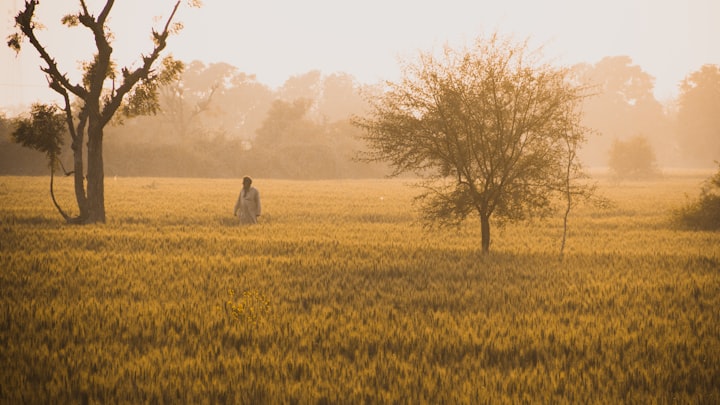The Rich Folklores of Punjab
Tales of Love, Tragedy and Heroism

Folklores are traditional stories, beliefs, customs, and practices that are passed down orally from one generation to the next within a particular culture or community. These stories often involve supernatural or mythical elements and are used to explain the world and its mysteries.
Folklores can take many forms, including myths, legends, fairy tales, fables, and folktales. They often feature characters and events that are exaggerated or fantastical, and they may convey moral lessons or cultural values.
Folklores are an important part of many cultures and are used to help people understand their history, beliefs, and traditions. They are often associated with particular regions or ethnic groups and may vary depending on the specific community that tells them. Many folklores have been passed down for centuries and continue to be an important part of cultural identity and heritage.
Punjab
Punjab is a region located in South Asia, primarily in the northwestern part of the Indian subcontinent, which is divided between India and Pakistan. It is one of the most culturally and linguistically diverse regions in the world, with a rich history and a vibrant tradition of folklore, which includes stories, legends, myths, and tales that have been passed down orally from generation to generation. These folklores reflect the culture, beliefs, and values of the people of Punjab, and they are an important part of the region's cultural heritage. Some of the most famous folklores associated with Punjab include:-
Heer Ranjha: A tragic love story about a young woman named Heer and her lover, Ranjha, who belonged to rival families.
Sohni Mahiwal: Another famous love story about a woman named Sohni and a man named Mahiwal, who was a poor but kind hearted.
Mirza Sahiban: A story about a young couple, Mirza and Sahiban, who belonged to rival tribes and were ultimately doomed by the actions of Sahiban.
Dulla Bhatti: A heroic figure associated with the festival of Lohri, who is celebrated throughout Punjab for his bravery and generosity.
Puran Bhagat: A story about a prince named Puran Bhagat, who renounced his royal privileges and became a saintly figure known for his wisdom and compassion.
These folklores, and many others like them, have been an important part of Punjab's cultural identity for centuries. They continue to be celebrated and passed down through generations, providing a window into the rich history and traditions of the region.
Here are the tales, rich in love, tragedy, and heroism.
Heer Ranjah
According to the legend, Heer was the daughter of a wealthy Jat family in the town of Jhang in Punjab. Ranjha, on the other hand, was a poor but handsome shepherd who lived in the nearby village of Takht Hazara. The two met one day when Heer went to the fields to fetch water, and Ranjha was struck by her beauty.
Despite the fact that their families were bitter enemies, Heer and Ranjha fell deeply in love and began secretly meeting each other. However, their happiness was short-lived, as Heer's family discovered their relationship and forbade her from seeing Ranjha.
Determined to be with his beloved, Ranjha left his village and became a wandering ascetic, hoping that his devotion to God would bring him closer to Heer. He eventually made his way to Heer's hometown, where he disguised himself as a Muslim faqir and became a servant in her father's house.
Although Heer recognized Ranjha immediately, she kept their relationship a secret from her family and continued to meet him in secret. However, their happiness was once again short-lived, as Heer's jealous uncle Kaido poisoned her and Ranjha was accused of being responsible for her death.
Ranjha was devastated by the loss of Heer and wandered the countryside, searching for a way to be reunited with her. Eventually, he too died of a broken heart, and the two lovers were buried next to each other in Jhang.
The story of Heer Ranjha is often seen as a symbol of the power of love to overcome societal barriers and obstacles. It has been retold in many different forms, including plays, films, and books, and remains a beloved part of Punjab's cultural heritage.
Sohni Mahiwal
Long, long ago, in the fertile land of Punjab, there lived a beautiful woman named Sohni. Sohni was the daughter of a potter who made beautiful earthen pots and sold them in the local markets. Sohni was an expert in painting the pots and making them even more beautiful. But little did she know that her destiny was about to change forever when she met the love of her life, Mahiwal.
Mahiwal was a poor but kind-hearted young man who made a living by herding cattle. One day, as he was grazing his cattle near the river, he saw Sohni working on her pots. She was so beautiful that he was immediately smitten by her. Sohni too had noticed Mahiwal and was drawn towards him by his kind heart and caring nature.
They soon fell in love and began to meet secretly near the river every night. Sohni would light a lamp in her home, and Mahiwal would light a fire on the other side of the river to signal to her. Then, he would swim across the river to be with Sohni, and they would spend the night talking and laughing, completely unaware of the world around them.
But their love was not meant to be easy. Sohni's father was against their relationship and forbade her from seeing Mahiwal. In desperation, Mahiwal left his home and became a wandering fakir, living on the banks of the river where he and Sohni used to meet.
But fate had other plans. One stormy night, as Mahiwal was trying to cross the river to be with Sohni, the river was in spate, and he drowned. Sohni, unable to bear the pain of separation, jumped into the river and drowned herself.
And so, the river that had witnessed their love and passion became their final resting place, and it is said that even today, on moonlit nights, the ghosts of Sohni and Mahiwal can be seen wandering near the riverbank, holding hands and lost in each other's love.
Mirza Sahiban
This is a story of love, loyalty, and sacrifice that has been told and retold for centuries, and still captivates the hearts of many.
Mirza and Sahiban were childhood friends who grew up together in a village nestled in the heart of Punjab. As they grew older, their friendship blossomed into a deep and pure love that knew no bounds. They spent their days together, wandering through the fields, laughing, and dreaming of a future where they could be together forever.
But their happiness was short-lived. Sahiban's family arranged her marriage to another man, and despite Mirza's desperate pleas, she was taken away from him. Heartbroken and determined to win her back, Mirza set out on a perilous journey to find Sahiban. As he arrived at Sahiban's village, he was ambushed by her brothers who were determined to stop him from taking their sister away. But Mirza was undeterred. In a fierce battle, he fought valiantly, but he was outnumbered and outmatched. In a final act of desperation, he called out to Sahiban, begging her to bring him his weapons. But instead of helping him, Sahiban cut the straps of his saddle, causing him to fall to the ground. As Mirza lay dying, his last thoughts were of Sahiban and the love he had for her. He died knowing that nothing could break the bond that they shared. Upon realizing the gravity of her actions, Sahiban was consumed by guilt and grief. She died soon after, unable to live without Mirza.
It is said that the two lovers were buried side by side in the very field where they used to play as children. The tale of Mirza Sahiban serves as a timeless reminder of the power of love, the dangers of betrayal, and the unbreakable bond that can exist between two people who are meant to be together.
Dullah Bhatti
Long ago, in the northern region of Punjab (Pindi Bhattian, near Lahore, Pakistan), there lived a brave and righteous man named Dulla Bhatti, a Robinhood of Punjab. He was a warrior who fought for justice and stood up against tyranny and oppression.
The story of Dulla Bhatti begins during the reign of the Mughal emperor Akbar. The emperor had appointed a cruel governor named Raja Todar Mal to rule over the people of Punjab. Under his rule, the people of Punjab suffered greatly. They were forced to pay exorbitant taxes and were subjected to unspeakable atrocities.
Dulla Bhatti, who had witnessed the suffering of his people, decided to take a stand against the tyrannical governor. He formed a band of fearless warriors, and together, they launched a series of daring raids on the governor's men, caravans and wealthy merchants.
However, Dullah Bhatti is perhaps best known for his role in the festival of Lohri, which is celebrated in the Punjab region to mark the winter solstice According to legend, Dulla Bhatti's most significant act of bravery came when he rescued a group of young girls from being sold into slavery. These girls were the daughters of poor families who could not afford the taxes imposed by Raja Todar Mal. Dulla Bhatti took these girls under his wing, and he became their protector and mentor. He provided them with a safe haven where they could learn and grow without fear of being exploited. Every year, on the night of Lohri, he would lead a procession through the streets, singing songs in praise of the girls' bravery and distributing sweets and gifts to the children of the town.
In honor of his bravery and kindness, the people of Punjab began to sing songs about him. His legend grew, and soon, he became a symbol of hope and inspiration for the oppressed people of Punjab.
Even today, Dulla Bhatti is remembered as a hero who stood up against tyranny and fought for the rights of his people. His legacy continues to inspire generations of Punjabis, who see in him a shining example of courage, selflessness, and compassion.
Puran Bhagat
Once upon a time in ancient Punjab, there was a man named Puran Bhagat. Born into a wealthy family, he was educated in the ways of the world and was expected to take over the family business. However, Puran Bhagat was not content with a life of material wealth and power. He yearned for something more profound, a purpose beyond worldly desires.
One day, he heard the teachings of a great saint who had renounced all worldly possessions and dedicated his life to serving others. Puran Bhagat was deeply moved by the saint's words and decided to follow in his footsteps.
He left his luxurious life behind and set out on a journey of self-discovery. He wandered from village to village, living off the charity of others and devoting himself to the service of the poor and needy. Puran Bhagat quickly gained a reputation for his kindness and selflessness, and people started calling him the "Bhagat," which means a devotee of God.
As he traveled, Puran Bhagat encountered various challenges and obstacles. In one instance, he came across a village where the people were suffering from a severe drought. They were all starving and dying of thirst, and their crops had withered away.
Puran Bhagat immediately sprang into action. He went from house to house, asking for food and water to distribute among the people. He even gave away his own clothes and belongings to help the villagers. Through his efforts, the people's faith was restored, and the rains came, bringing new life to the village.
But Puran Bhagat's ultimate test came when he was falsely accused of a crime he did not commit. The king, who was known for his cruelty, had him arrested and brought before the court. The crime was theft, and Puran Bhagat was accused of stealing from the royal treasury. Puran Bhagat was heartbroken. He knew he was innocent, and yet he was being punished. He pleaded with the king, asking him to reconsider his decision. But the king was stubborn, and he refused to listen.
Finally, the day of Puran Bhagat's execution arrived. The king ordered him to be taken to the gallows, and the whole town came to witness the event. But Puran Bhagat did not despair. He remained steadfast in his faith and never lost sight of his goal. He prayed to the Almighty, asking for forgiveness for his accusers and his own sins. Just as the executioner was about to pull the lever, something miraculous happened. The sky grew dark, and a powerful storm raged across the land. The king realized his mistake and was filled with remorse. He begged for Puran Bhagat's forgiveness, and in that moment, the storm abated, and the sun shone again.
Puran Bhagat's act of forgiveness and his unwavering faith had moved the heavens themselves, and his legend spread far and wide. Even today, he is revered as a symbol of selflessness, devotion, and unwavering faith in the divine.
To conclude, Punjab's rich tradition of folklore is a testament to its vibrant culture and history. These stories, passed down through generations, continue to captivate and inspire people, providing a glimpse into the values, beliefs, and customs of the people of Punjab. From tragic love stories to heroic tales, these folklores have something to offer to everyone. They are a vital part of the region's cultural identity and heritage, and their enduring popularity is a testament to their timelessness and universality. So the next time you visit Punjab, take the time to explore its rich folklore tradition and discover the magic and wonder of these timeless stories.
If you find the stories interesting, kindly give a like and offer comments, if possible.
About the Creator
Muhammad Arslan
I have a passion for exploring the unknown from the intricacies of the human to the mysteries of ancient civilizations. I bring science history and mystery to life through my writing. Join me on a journey of discovery to explore together.





Comments
There are no comments for this story
Be the first to respond and start the conversation.